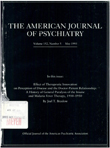Establishing the onset of psychotic illness
Abstract
OBJECTIVE: To date, the literature has provided no standardized, replicable method for establishing illness onset. The authors describe a method for dating the first appearance of prodromal signs of psychotic illness, the emergence of an acute episode, and the initiation of treatment seeking. METHOD: Using reports by family and friends about a sample of 141 subjects with first-episode psychosis, the investigators derived a checklist of behaviors describing the evolution of various phases of illness. Supplied with the checklist, clinician pairs independently rated the critical phases in the evolution of illness: first appearance of noticeable symptoms, first appearance of prominent psychotic symptoms, and initiation of treatment seeking. RESULTS: The judges achieved good reliability in assigning age at the first appearance of psychotic symptoms and at initiation of treatment seeking. Judging the beginning of the prodrome proved more difficult. Insidious onset proved as characteristic of affective psychosis as of schizophrenia, while treatment lag--the interval between emergence of acute psychotic symptoms and initiation of treatment seeking--was longer for schizophrenia than for affective psychosis. Onset of schizophrenia occurred earlier in women than in men. Depression with psychotic features appeared earlier in men than women. CONCLUSIONS: Although dating the onset of illness phases is probably feasible, efforts to improve reliability must continue. The study results challenge beliefs about gender differences in age at onset.
Access content
To read the fulltext, please use one of the options below to sign in or purchase access.- Personal login
- Institutional Login
- Sign in via OpenAthens
- Register for access
-
Please login/register if you wish to pair your device and check access availability.
Not a subscriber?
PsychiatryOnline subscription options offer access to the DSM-5 library, books, journals, CME, and patient resources. This all-in-one virtual library provides psychiatrists and mental health professionals with key resources for diagnosis, treatment, research, and professional development.
Need more help? PsychiatryOnline Customer Service may be reached by emailing [email protected] or by calling 800-368-5777 (in the U.S.) or 703-907-7322 (outside the U.S.).



